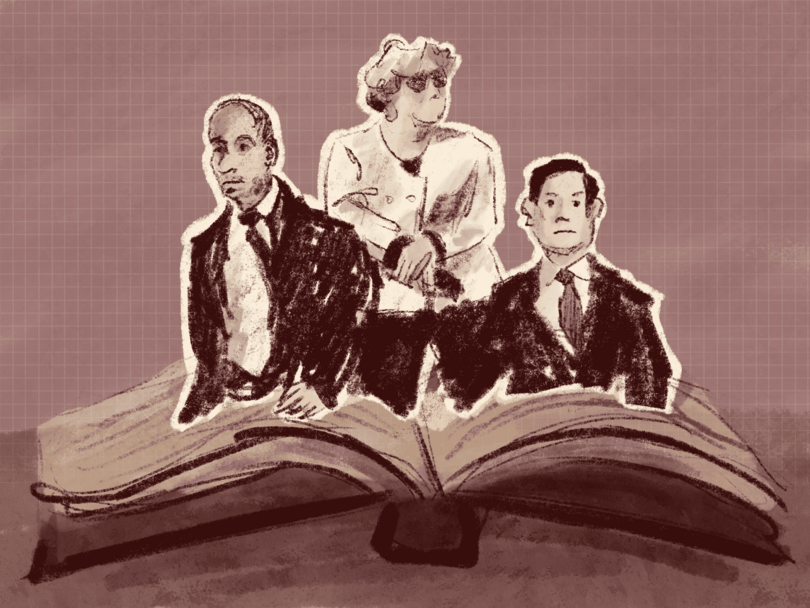Opinion: Line between cautionary tales, reality are blurring in politics

Our columnist warns classic dystopias are no longer fiction. From censorship to reproductive oppression and immigration cruelty, we’ve stepped into the stories that were meant to scare us, not define us Emma Lee | Contributing Illustrator
Get the latest Syracuse news delivered right to your inbox.
Subscribe to our newsletter here.
UPDATE: This post was updated at 10:32.
Reality TV producer Rob Worsoff has quite a pitch for the United States Department of Homeland Security: a show where immigrants compete for U.S. citizenship based on American traditions and customs.
Worsoff even said it would be a commercial hit with many corporate sponsorships — and nothing is more American than collaborating with corporations.
The Daily Mail originally broke the story and claimed DHS Secretary Kristi Noem, whom it has accurately dubbed “ICE Barbie,” was backing the reality show. Other news outlets followed the story, like the New York Times, CNN and Vanity Fair, allowing for it to gain plenty of attention. However, Noem recently debunked plans to pick up the pitch.
But with Noem using an El Salvador prison as a photo op and a chance to intimidate immigrants residing in the U.S., it isn’t shocking that people believe she’d bring this idea to life.
As if the concept itself wasn’t interesting enough, Worsoff is now fighting off criticisms that his idea is similar to “The Hunger Games.” This connection most likely comes from the suspension of the asylum immigration system by the Trump administration. When you can’t gain citizenship for fleeing religious persecution or war, but you can for winning a game show, the line between our political climate and the cautionary tales of our childhoods blur.
This dialogue also opens a conversation for our political media landscape. We should be asking ourselves how the content many use for escapism intersects with our modern reality.
Suzanne Collins, the author of “The Hunger Games,” was originally inspired to write the series while flipping through TV channels, seeing clips of reality TV juxtaposed with the Iraq War. Collins also used the series to dive into the “just-war theory,” a way to decide what circumstances make the act of waging war moral. It seems like a relevant idea in a country with a powerful military-industrial complex.
While our government isn’t sending us to fight to the death in an arena, you can’t justify U.S. citizens going without healthcare, housing or food while our government funds foreign wars. Personally, I’d prefer my tax dollars feeding the hungry over bombing other countries.
Margaret Atwood, the author of “The Handmaid’s Tale,” still has the newspaper clippings of the real-life events that inspired her dystopia, Gilead. It should come as no surprise that we now see events from the adapted show mirror our real life.
Adriana Smith, a 30-year-old mother and nurse, is currently brain-dead and pregnant in a Georgia hospital. Instead of allowing her family the closure of a humane goodbye, hospital staff have said they must keep her alive due to the state’s abortion bans.
This bodily violation has prompted a deeper look into its legality, and references to when this exact story was told through actors on our screens. Adriana Smith deserves dignity after death, as you or I would.
Continue to say that things like Worsoff’s pitch, Adriana Smith’s medical mistreatment or book censorship remind you of dystopias you consume — because they should.Bella Tabak, Columnist
I still remember when Roe v. Wade fell, and I, along with many others, foresaw a descent into a society similar to the one depicted in “The Handmaid’s Tale.” I also remember those who pushed back against feminists and protestors who used this media to criticize the court’s decision. Usually, an “I told you so” feels satisfying, but this one just feels hollow.
We can no longer gloss over the growing absence of literature in America with all of these parallels materializing right before us. Censorship is on the rise, and particularly targets the very novels mirroring our current society. Most ninth-grade English reading lists include dystopias rooted in real events, such as Ray Bradbury’s “Fahrenheit 451,” which was inspired by Nazi book burnings and Soviet ideological repression.
Even though I read this book as a 15-year-old, its message followed me into higher education. Torching books suppresses critical thinking, history and knowledge. We may not see pages physically go up in flames today, but books are facing a threat that leads to burnings: bans. Nearly 16,000 books in public schools have been banned nationwide, with many of the titles subject to bans including themes of race, gender and sexuality.
One Florida college destroyed its gender studies program and then proceeded to throw away the program’s books. If Bradbury’s works left his readers with anything, it’s that books are not kindling for a fire, or trash for a dumpster. These pieces and subjects aren’t controversial and can’t be treated as taboo – they are the books that teach our students the most.
Thankfully, New York has just passed legislation to prevent book censorship. This change was brought to the State Senate by Sen. Rachel May, whose ideas were amplified by Syracuse University alumna Cjala Surratt. With two bills passing to protect access to a wide array of books in local and school libraries, this media will continue to serve as a vital resource, one where we can see through the lens of those who experience life differently than we do.
“For the Black community, the act of reading was once criminalized, and still, we’ve always found our way to the page,” Surratt said. “This is why their protection is paramount.”
Dystopian media can be an enticing way to escape our harsh realities. But, it is naive to continue to believe these stories exist so far from our reality.
We need to use dystopian books, movies and TV shows to critically analyze the parts of our society that can be unfair and scary. Pick up the books that can broaden your viewpoint. Continue to say that things like Worsoff’s pitch, Adriana Smith’s medical mistreatment or book censorship remind you of dystopias you consume — because they should.
Bella Tabak is a junior majoring in magazine journalism. She can be reached at batabak@syr.edu
Correction: A previous version of this article said Cjala Surratt was a collaborator on the New York legislation preventing book bans. Surratt was an advocate for the bill, sharing it on media platforms. The Daily Orange regrets this error.






